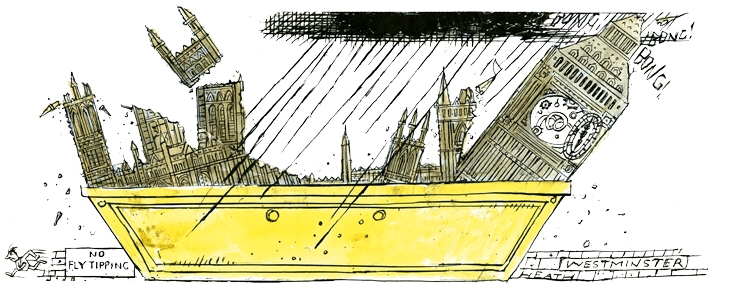Home
Theresa May, the Prime Minister, wrote to Donald Tusk, the President of the European Council, asking for a delay of the date for Brexit. She had been wondering whether to solicit a third ‘meaningful vote’ before or after going off to the EU summit in Brussels on Thursday. Heaps of money had been put aside to buy off the DUP and unreal talk had been launched about the Vienna Convention providing a way out of the Irish backstop. But now, asked if Britain was in a crisis, a No. 10 spokesman said: ‘That situation has come to pass.’
The tragicomedy of Brexit had taken an unexpected turn after John Bercow, the Speaker of the House of Commons, lobbed in a grenade by declaring that ‘What the government cannot legitimately do is resubmit to the House the same proposition — or substantially the same proposition — as that of last week, which was rejected by 149 votes.’ This convention had been established by Mr Speaker Phelips on 2 April 1604, and had attracted desultory discussion last week. Parliamentary politics came to resemble a ship in a storm driven on to rocks. A government motion to rule out leaving the EU on 29 March without a deal had been amended by 312 votes to 308 to apply to any date. This amended motion was opposed by the government, but passed by 321 to 278. Gavin Barwell, the chief of staff to the Prime Minister, was accused of suggesting that it was permissible for ministers to abstain, although he later denied it was that simple. But the cabinet ministers David Gauke, Greg Clark, David Mundell and Amber Rudd chose not to vote with the government. The next day a motion for a series of indicative votes by the Commons was defeated by 314 to 312. A motion for another referendum was defeated by 334 to 85. In confused scenes, the Commons then voted by 412 to 202 in favour of a government motion to request from the EU a delay of the date of leaving until 30 June (supposing a withdrawal agreement to be in place by 20 March, otherwise a much longer delay was envisaged). Stephen Barclay, the Brexit Secretary, wound up for the government before that vote, but then voted against its motion.
More people than ever before — 32.7 million — were in work, 473,000 more than a year earlier. Unemployment fell to 3.9 per cent, the first time it had been below 4 per cent since 1975. Interserve, the outsourcing company responsible for such things as making school meals and maintaining military bases in the Falklands, went into administration. The group owning Frankie & Benny’s eateries said it would close 77 of the 248 restaurants. Water companies in the south of England explored joint action to bring water from the north and Wales. The MP Fiona Onasanya, formerly of the Labour party and freed after serving a month of her three-month sentence for perverting the course of justice, made a video against the projected skyline of New York. It was aimed at constituents considering whether to sign a recall petition against her, and in it she said: ‘I have not perverted the course of justice.’
Abroad
Brenton Tarrant, an Australian aged 28, shot dead 50 people at two mosques in Christchurch, New Zealand, and wounded dozens. He live-streamed the crime on Facebook. Jacinda Ardern, the Prime Minister of New Zealand, said: ‘You will never hear me mention his name.’ Gokmen Tanis, a 37-year-old born in Turkey, was arrested a few hours after three people were killed in a shooting on a tram in Utrecht.
A storm left hundreds of square miles in Mozambique and Zimbabwe under water, killing more than 200 people, and leaving thousands homeless. The American-backed Syrian Democratic Forces overran Isis’s last-held positions by the Euphrates near Baghouz. The head of the Paris police was to be replaced and future protests banned after ultra-leftists among 10,000 gilets jaunes protestors on their 18th weekend of demonstrations damaged 92 shops around the Champs-Élysées, burning out Fouquet’s restaurant.
Nursultan Nazarbayev resigned as the President of Kazakhstan, which he had ruled since 1990. Tsunekazu Takeda, the head of Japan’s Olympic Committee, decided not to seek re-election after French prosecutors looked into claims that a €2 million bribe was paid to secure Tokyo’s winning bid for 2020. A five-year-old Belgian racing pigeon called Armando was sold at auction for more than a £1 million to a Chinese enterprise that will use him for breeding. CSH






Comments